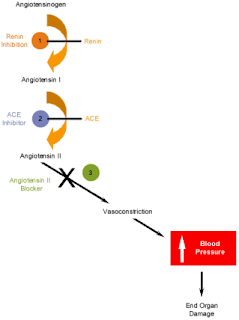 The ONTARGET trial was on the major trials looking at the potential benefits of dual ACE-inhibitor (ACE-I)/angiotensin receptor blocker (ARB) therapy. Although it was not intended to specifically examine the effects of dual blockade of the renin-angiotensin system on progression of CKD as a primary outcome, a 2008 Lancet article analyzes this trial from a renal perspective.
The ONTARGET trial was on the major trials looking at the potential benefits of dual ACE-inhibitor (ACE-I)/angiotensin receptor blocker (ARB) therapy. Although it was not intended to specifically examine the effects of dual blockade of the renin-angiotensin system on progression of CKD as a primary outcome, a 2008 Lancet article analyzes this trial from a renal perspective. ONTARGET was a randomized, double-blind comparison of three different groups: the ACE-inhibitor ramipril alone (10mg po qd), the ARB telmisartan alone (80mg po qd), or a combination group which received both ramipril and telmisartan.
I won't go into the gory details (a good summary in AJKD by Jeffrey Berns can be found here), but the upshot is that although combination therapy improved proteinuria, it resulted in overall worsened renal outcomes, including a requirement for dialysis or a doubling of serum creatinine.
There are several caveats to this trial--for example, most of the patients in the trial did not have CKD to begin with, so it is not the ideal population to answer the question of whether or not dual blockade therapy is a good strategy for preventing the progression of existing CKD--but it does suggest that we should not uniformly use the dual-blockade strategy blindly, despite its seemingly sound physiologic rationale. It also suggests that further trials designed to look at the effects of dual ACE/ARB therapy should look at hard outcomes (such as death, need for dialysis, doubling of serum creatinine, etc) rather than simply using the surrogate marker of proteinuria as a primary outcome.

I suppose ACE inhibitor therapy is contraindicated in cases of renal artery stenosis, and other microangiopathies. But it does bring about an overall improvement with regard to proteinuria.
ReplyDeleteI always thought angiotensin receptor inhibitors were required to be used only on account of some sort of intolerence to ACE inhibitors (which can cause pulmonary disorders). I therefore do not understand why was the need for the combination therapy in the first place when technically though by different means, both drugs basically perform the same function?
There's no doubt that either ACE-I or ARB is highly effective for treatment of proteinuria. All patients with diabetic nephropathy should be on one or the other. The question is whether use of both together would be advantageous. The theory behind this is that using an ACE-I or an ARB alone does not completely shut down the renin-angiotensin-aldosterone access, it merely inhibits it. Perhaps by blocking the RAAS at multiple points you could have a more robust effect on treating proteinuria. While more potent blockade might seem like a good idea, it also might lead to more side effects (e.g., more hyperkalemia, greater hemodynamic effects, etc.)
ReplyDelete